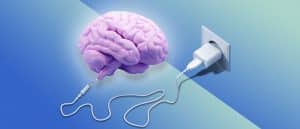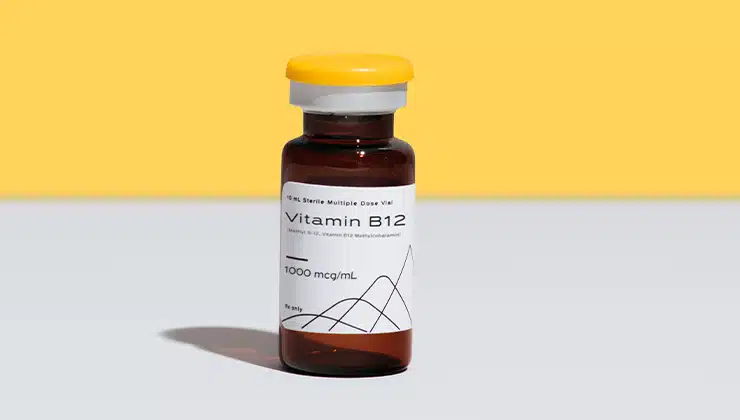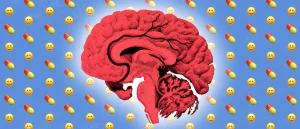4 Supplements That Will Actually Help You Focus
30-Second Takeaway
- Nutrient deficiencies can put you at risk for inflammation, which can cause cognitive decline.
- Your brain needs a certain amount of key nutrients—like vitamin E, B, and omega-3s—to function optimally.
I
f you’re regularly plagued with brain fog and an inability to focus midway though your workday, it’s tempting to swallow a brain health supplement (chased with a double espresso for good measure) to help you power through.
Problem is, the science is mixed on whether some popular focus supplements—like nootropics and ginkgo biloba—produce legit cognitive health benefits. Instead of buzzy ingredients, the key is getting enough of the right, brain-supporting nutrients.
“A well-functioning brain requires a sufficient energy supply [from nutrients] to maintain focus and cognitive function,” says Fred Pescatore, M.D., an integrative medicine physician. And certain, research-backed supplements can help if you’re having trouble balancing all your vitamins with your daily macros.
Here are the best focus supplements that will actually help you stay on your A-game all day, everyday.

ABOUT THE EXPERT
Dr. Fred Pescatore is an integrative medicine physician and author with over 10 years of experience researching and consulting in the nutritional supplement industry. He currently runs his own practice, Medicine 369, in New York.
The Best Focus Supplements, According to an Integrative Medicine Physician
Vitamin E
Vitamin E, which is found in foods like nuts, seeds, and produce such as pumpkin and avocados, helps to preserve your cognitive function by protecting cells from damage associated with oxidative stress (when free radicals outpace antioxidants), Pescatore explains. While other parts of your body can fall prey to oxidative stress, the brain is particularly susceptible, given its high oxygen consumption (1).
Unchecked oxidative stress is linked to an increased risk for dementia, Parkinson’s, and anxiety (2). The flip side: According to a study in the International Journal of Molecular Sciences, having higher levels of vitamin E in the blood is linked to improved memory and focus in aging adults and people with Alzheimer’s disease (3).
An estimated 90 percent of us don’t get enough vitamin E (4), which is why supplementing can be a smart move. Pescatore recommends meeting the recommended daily volume of 15mg of vitamin E to improve cognitive function.
Omega-3 fatty acids
While recent studies suggest that fish oil isn’t as helpful for heart health as experts once thought, the research is more bullish when it comes to the link between omega-3 fatty acids and improved learning, memory ability, cognitive well-being, and blood flow in the brain (5).
For example, healthy adults with higher blood plasma concentrations of omega-3 fatty acids were found to have better brain structure and cognitive function, according to a 2022 study in the journal Neurology (6).
If you’re not getting enough omega-3s—like nearly 68 percent of adults in the United States—you run a greater risk for developing chronic low-grade inflammation (7, 8). Inflammation can increase your lifetime risk of all sorts of healthspan-axing diseases like cancer, diabetes, and arthritis, but you’ll likely notice the impacts of inflammation on your brain (like depression, fatigue, and anxiety) first (9).
Pescatore recommends getting 1.1 grams of omega-3 through food and supplements daily to support brain health and focus. Fatty fish (like salmon), flax seeds, and chia seeds are high in omega-3 fatty acids.
Pycnogenol®
Pycnogenol®—an extract from French maritime pine bark—can be taken as a stand-alone supplement or in combination formulas to support brain health, according to Pescatore.
“Studies on business owners and professionals showed significant improvement in attention span and overall mental performance when they supplemented with Pycnogenol,” Pescatore says.
Improving focus is just one of the brain health benefits of Pycnogenol®. Early research suggests that the supplement may also prevent stroke, improve blood flow, and mitigate depression and anxiety (10, 11).
Pescatore recommends a 100mg daily dose to boost focus.
Vitamin B
If you’re deficient in B vitamins, particularly B12, you’ll start to feel like crap— and the Cleveland Clinic estimates that up to 15 percent of adults aren’t getting enough.
A vitamin B12 deficiency is linked to nasty neurological symptoms like vision problems, confusion, and memory lapses (12). Worse yet, research suggests that certain types of neurological damage dealt from a vitamin B deficiency are hard to reverse (13).
“B-Vitamins play a vital role in energy production at the cellular level,” Pescatore explains. B-vitamins—like B12 and B6—support the metabolic reactions that are responsible for converting food into energy.
Vitamin B12, now available from Hone, may boost your energy, reduce stress, and support your brain. Connect with a doctor to see if it’s right for you.
Pescatore notes that the dosage varies per B vitamin, so follow the recommended daily amount indicated by the National Institutes of Health. Citrus fruits—such as oranges, grapefruit, and clementines—contain more than five types of B vitamins.
References
1. Salim (2017). Oxidative Stress and the Central Nervous System.
2. Gugliandolo, et al (2017). Role of Vitamin E in the Treatment of Alzheimer’s Disease: Evidence from Animal Models.
3. Traber (2014). Vitamin E Inadequacy in Humans: Causes and Consequences.
4. Adler, et al (2022). Effects of Omega-3 Polyunsaturated Fatty Acids on Brain Functions: A Systematic Review.
5. Satizabal, et al (2022). Association of Red Blood Cell Omega-3 Fatty Acids With MRI Markers and Cognitive Function in Midlife: The Framingham Heart Study.
6. Murphy, et al (2021). Long-chain omega-3 fatty acid serum concentrations across life stages in the USA: an analysis of NHANES 2011–2012.
7. O’Keefe, et al (2018). Importance of maintaining a low omega–6/omega–3 ratio for reducing inflammation.
8. Pawha, et al (2023). Chronic Inflammation.
9. Mei, et al (2014). Pycnogenol Ameliorates Depression-Like Behavior in Repeated Corticosterone-Induced Depression Mice Model.
10. Kim. et al (2020). Pycnogenol® Supplementation Attenuates Memory Deficits and Protects Hippocampal CA1 Pyramidal Neurons via Antioxidative Role in a Gerbil Model of Transient Forebrain Ischemia.
11. Adler, et al (2020). Low Vitamin B12 Levels: An Underestimated Cause Of Minimal Cognitive Impairment And Dementia.
12. Reenan (2006). Clinical Manifestations of Vitamin B-12 Deficiency.












